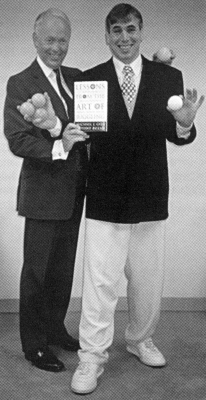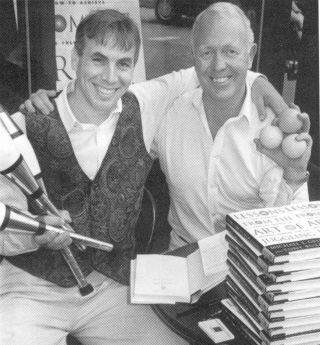
Buzan and Gelb |

(l-r) Michael Gelb and Tony Buzan at a books signing last summer during the IJA festival in Burligton, VT. |
Page 20 Winter 1994 - 95
|
TRICKLE DOWN JUGGLING Buzan and Gelb Try to Change the World by Teaching Juggling to the Corporate Elite by Bill Giduz
Tony
Buzan and Michael Gelb, two highly successful corporate motivational
speakers, use juggling as a metaphor for teaching clients
Toward
that end, they've aimed their program not at school children or
festival crowds, but at the world's top executives. They want to
maximize their influence by teaching people who control vast resources
and hold influence over many others.
Gelb
and Buzan have recently made their high-price corporate seminars more
accessible to laymen by condensing its messages in the new Harmony
Books volume, "Lessons from the Art of Juggling." The book
has been selling extremely well, with the publisher naming it as one
of its "hot books" of last fall. One reason may be that Gelb
taught the whole sales staff at Random House how to juggle!
Gelb
believes that jugglers already inherently understand a fact that most
corporate moguls need to learn - that relaxed concentration is the
secret of high performance in business and life. "The more we
learn about juggling, the more convinced we are that it is the perfect
metaphor for learning how to learn," he said.
Buzan added, "Learning is easiest when it is approached with a spirit of joy and wonder. Juggling awakens that spirit and offers a practical metaphor for business success
and personal growth."
..
Global
corporations are constantly seeking ways to deliver high-quality
service at a competitive price, and that requires more efficient use
of resources. "The result is a new emphasis on human potential,
and this is the positive side of capitalism," Gelb said.
"They are desperately in need of learning how to juggle as a
metaphor for a better way of doing business."
Gelb
and Buzan have developed longterm consulting relationships with
firms such as National Public Radio, Du Pont, Amoco, Management Center
Europe and Merck to try to change their whole corporate climates to
better support individual creativity. The success that the pair has
enjoyed can be measured in part by the many sets of bean bags they say
are now found on the desks of executives in those businesses.
Since
1978, Gelb and Buzan have trotted around the globe handing out tennis
balls to corporate managers, then telling them to drop them on the
floor. They want to teach that learning moves toward success, but that
progress incorporates ups and downs. To effectively learn, student
must embrace the process of trial and error at higher and higher
levels. Beginners must lose the fear of dropping balls, and experts
must learn to analyze their actions through continual self-reflection.
Veteran
jugglers might discount this pair as Johnny-corne-lately intellectuals
jumping on the juggling bandwagon, but Gelb in particular has paid his
dues. He learned to juggle as a 20-year-old in 1974 while a graduate
student at the International
Gelb
returned to the states briefly and teamed up with Stuart Haber, an
accomplished juggler and Harvard math student, as "The Juggling
Fools," doing street shows in Cambridge, Mass.
He
returned to England to study The Alexander Technique for mind and body
coordination, and stopped juggling entirely for three months. But his
Alexander training helped him quickly advance his skills when he again
picked up his props. He also applied the Alexander Technique in
learning to sing, dance, write, speed read and ride a unicycle.
He
learned five balls and began working as a jester in a nightclub,
"Beefeater by the Tower," to fund his studies. One day he
followed a rubber chicken he saw flying above the crowd and found
Lloyd Timberlake tossing it up and down. They formed an act that,
through happenstance, led them to an evening's performance as the
opening act for The Rolling Stones and another night on stage with Bob
Dylan.
He
conceived his "juggling metaphor method" in 1974 also, a
year before he met Tony Buzan, another enthusiast for everything that
expands horizons of human potential. Buzan had originated a system of
"mind mapping" for improvements in planning ability, recall,
organization and creativity, and Gelb immediately recognized it as an
insightful way to "juggle ideas."
Buzan
recalled, "I had always
They
developed a five-day
Juggling
lessons were, from the beginning, a basic part of the curriculum.
Buzan explained, "With juggling you've got an immediate
demonstration tool for our learning techniques. It's something most
people think is difficult, but which most can actually learn easily.
There's a lot of assumed complexity and a lot of fear. It's a
beautiful metaphor to show how you can learn from your mistakes."
Buzan
used the same learning methods previously to help improve performances
of swimmers, rowers, dancers and runners, but found juggling to be a
much more portable, approachable and achievable metaphor for group
instruction of business executives than any other athletic skill. |

Buzan and Gelb |

(l-r) Michael Gelb and Tony Buzan at a books signing last summer during the IJA festival in Burligton, VT. |